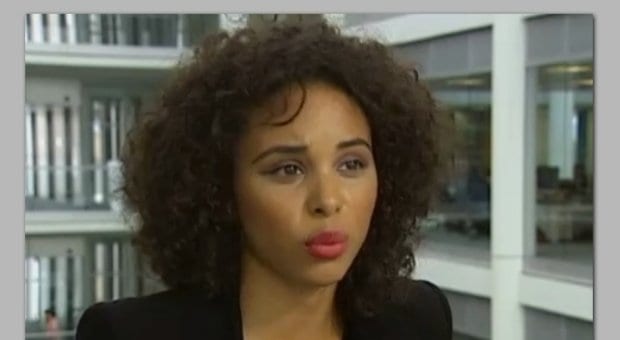
British heptathlete Louise Hazel. Credit: 3news.co.nz
After making controversial remarks about her country’s recently enacted anti-gay laws, Russian pole vaulter Yelena Isinbayeva says her comments have been misconstrued, The Guardian reports.
Isinbayeva criticized Swedish athletes for painting their nails in rainbow colours in protest against the laws, saying they were wrong to make such gestures while competing on Russian soil at the world athletics championships. Isinbayeva also defended Russian laws that prohibit the propaganda of nontraditional sexual relations, at one point saying, “we consider ourselves like normal, standard people, we just live boys with women, girls with boys … it comes from the history.”
Backlash was swift, coming from sports pundits and athletes alike. Isinbayeva, who is a popular figure in her home country, is to serve as a Sochi Games mayor, and is an ambassador for the Youth Olympics.
In a statement released by the International Association of Athletics Federations (IAAF), Isinbayeva sought to clarify her stance, saying English is not her first language and her remarks have been misconstrued.
“What I wanted to say was that people should respect the laws of other countries particularly when they are guests,” she says. “But let me make it clear I respect the views of my fellow athletes and let me state in the strongest terms that I am opposed to any discrimination against gay people on the grounds of their sexuality [which is against the Olympic charter].”
In a tweet following Isinbayeva’s initial remarks, British heptathlete Louise Hazel asked: “Do you agree that as an Ambassador for the Youth Olympic Games the International Olympic Committee need to discipline Isinbayeva in light of her recent comments?!”
According to Towleroad.com, a statement from the International Olympic Committee also noted that English is not Isinbayeva’s first language, and it wanted to be “absolutely clear” about what she said and what she meant before making further comment.
Prominent gay rights activist Nikolai Alexeyev says Isinbayeva is one of Russia’s sports heroes, and her fellow citizens will listen to what she has to say, The Guardian notes.
Still, he urged international athletes to speak up at the Sochi Games, saying any attention brought to bear on the anti-gay laws will be effective.
He added: “If the championships took place without any problems, everyone would say everything is okay for us. When people are expressing themselves they understand that this is just the start, there will be much more of this in Sochi. The foundations have been laid.”
With the global outcry against Russia’s anti-gay laws growing and the related controversy over Isinbayeva’s comments, one IOC official expressed exasperation with the timing of the recent enactment of the Russian laws.
“Why on earth didn’t the government wait till after the Sochi Olympics. It’s created a right old mess,” Agence France-Presse quotes him as saying.
For its part, the US Olympic Committee (USOC) has condemned the laws, even as it insists that American athletes “comply with the laws of every nation that we visit.”


 Why you can trust Xtra
Why you can trust Xtra


